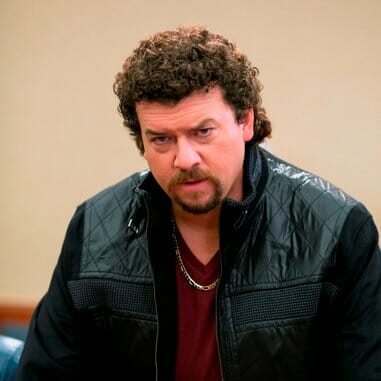
Kenny Powers isn’t dead.
Eastbound & Down doesn’t end like Breaking Bad. It doesn’t even end like The Sopranos, with its lead antihero’s fate up in the air. There is a bit of confusion at the end of Eastbound, but it’s clear that Kenny Powers, despite not really earning redemption, at least finds something of a happy ending. Maybe he shouldn’t?
Of course the show doesn’t give us that ending without major amounts of stress. For a while it looks like April is shot dead in a back alley after watching a movie (we know she’s old at the time because murdered April has bangs.) But then the flash forward haze ends and we realize that Eastbound’s last episode ends with Kenny rewriting the end of his screenplay, presumably in his new home in Santa Fe (based on the Kokopelli and the Native American bust on his desk.) He’s given up fame and fortune for good while resettling in New Mexico with April, Dakota and the kids (poor Yul Brynner, exiled to Stevie’s household.) He’s redeemed himself, setting aside the major stumbling block to his marriage. So why does he have to rewrite his autobiography to make himself cooler than Batman’s dad?
As Eastbound wound down, appropriating Batman’s origin and spiritually reinvigorating Kenny through a hoverbike-assisted second marriage in Africa, I was at first apprehensive of the blatantly ridiculous conclusion at which Danny McBride and Jody Hill arrived. Kenny once again throwing away his career in a very public fashion was almost expected (this time during an interview with the disgraced Guy Young on Kenny’s new Maury-ish daytime talk show), but the far future dénouement, although too ridiculous to believe even for Eastbound, seemed to be legit at first. As it grew more and more ridiculous, with Alexander Skarsgård and Lindsay Lohan playing Kenny and April’s grown kids, and a grey-haired Stevie showing up on hoverbike with Geordi La Forge goggles to toss Kenny’s ashes into the cosmos, it became obvious that some amount of fiction was creeping in to Kenny’s narration.
So we have to wonder: How cool with his new New Mexico family man life is Kenny? This is a guy who already spent five off-camera years working a low-paying job and focusing on his family, before throwing it all away for a primo TV gig and Christmas tree-shaped cocaine spreads. He’s given up both baseball and television fame in dramatic fashion, and yet he feels the need to fabricate a fantastic future biography without April in his own putative life story. Eastbound ends with Kenny sacrificing his own dreams to reconcile with his family, while crafting a late-in-life story that largely writes his family out of the picture. It’s kind of sad.
I liked this episode. I don’t know if it’s how I’d like the show to end. The previous episode, which I will write about soon (sorry guys), was maybe the best the show has ever been. This episode was hilarious, with a great guest turn from Sacha Baron Cohen as a detestable network executive, a final glimpse into the fractious marriage between Tim Heidecker and Jillian Bell’s characters, and a fine conclusion to Guy Young’s story, but its ending, while happy on the surface, is actually really depressing.
Eastbound (and Kenny Powers) deserves a depressing ending, though. This isn’t a feel-good show. It’s a dark look at fame and fortune and suburban America, with a particular focus on the nouveau riche soullessness that has overtaken the sprawling cities of the South. One reason I love Eastbound is that, outside of Kenny Powers and the occasional secondary character (like Ashley Schaeffer), the show doesn’t make a big deal out of its Southern locale. Kenny’s brother Dustin and Dustin’s family are regular, respectable citizens who happen to live in North Carolina. Tim Heidecker’s obnoxious Wake Forest graduate could live in any suburb anywhere in America. Eastbound is unmistakably Southern, but outside of Kenny it has generally presented the South in an understated and naturalistic way, cutting through much of the annoying exoticness with which Hollywood presents the South.
And at the center you have Kenny Powers, who summarizes every horrible part of the South in a single body. He’s not unique to the South, though—arrogant, misguided, would-be alpha males darken every state. Kenny Powers isn’t that different from the Southie thugs of Good Will Hunting, although he’s from the South instead of South Boston. He is a specifically Southern variation of the stereotype, though, and Danny McBride has played him to perfection over the last four seasons. It’s easy to see Kenny in every role McBride has ever played, and tough to see how he’ll ever escape Kenny’s shadow.
But so this is how it ends, with Kenny ditching his TV show to move to Santa Fe with April and their kids. I wrote on Twitter tonight that this was my Breaking Bad finale. I wasn’t joking. Eastbound has never gotten enough credit for the risks that it takes or its very specific and singular worldview. Although always hilarious, Eastbound could also be as painful and emotional as any drama, before making you feel ridiculous for taking the show seriously. It’s the most daring TV show in recent memory, and the most realistic depiction of the contemporary South. McBride and Hill are developing a new show for HBO, but it’s hard to see how they could create another show as vital as Eastbound & Down.
Season Rating: 9.0 / 10
Series Rating: 9.5 / 10
Garrett Martin edits Paste’s games section, writes about games for the Boston Herald and has spent 27 of his years living in the South.